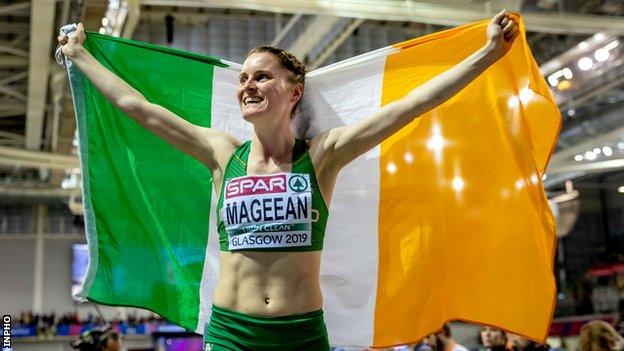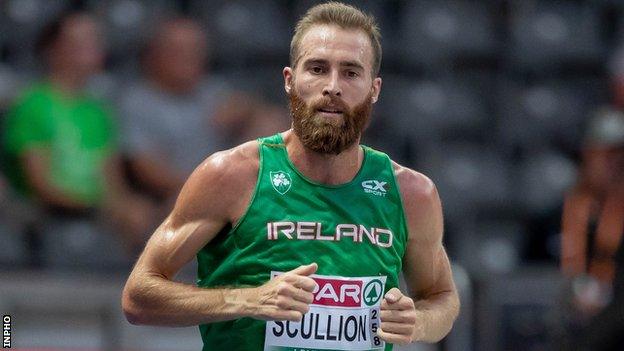Olympics: New dual Tokyo qualification system as standards are toughened
- Published

Ciara Mageean is among only two Irish athletes who achieved the IAAF's new Olympic Games standards last year
A new dual qualification process for next year's Olympics has been unveiled which comprises of tougher qualifying standards plus a world rankings system.
The IAAF wants to achieve 50% of target numbers for Tokyo from the tougher standards with the remaining 50% from the new world rankings system.
Only two Irish athletes - Thomas Barr and Ciara Mageean - achieved the new standards in 2018.
However, a number of others would have booked berths under the ranking system.
These athletes would have included the likes of Leon Reid and Phil Healy whose times from 2018 are marginally outside the tougher new Tokyo standards announced over the weekend.
Mageean's 2018 1500m best of 4:04.13 is inside the IAAF's standard of 4:04.20 while European bronze medallist Barr's season's best of 48.31 seconds in the 400m hurdles is comfortably inside the IAAF mark of 48.90.
Toyko Olympics qualifying standards | ||
|---|---|---|
Men | Event | Women |
10.05 | 100m | 11.15 |
20.24 | 200m | 22.80 |
44.90 | 400m | 51.35 |
1:45.20 | 800m | 1:59.50 |
3:35.00 | 1500m | 4:04.20 |
13:13.50 | 5,000m | 15:10:00 |
27:28.00 | 10,000m | 31:25.00 |
2:11.30 | Marathon | 2:29.30 |
8:22.00 | 3,000m steeplechase | 9:30.00 |
13.32 | 110/100H | 12.84 |
48.90 | 400H | 55.40 |
2.33 | High Jump | 1.96 |
5.80 | Pole Vault | 4.70 |
8.22 | Long Jump | 6.82 |
17.14 | Triple Jump | 14.32 |
21.10 | Shot Putt | 18.50 |
66.00 | Discus | 63.50 |
77.50 | Hammer | 72.50 |
85.00 | Javelin | 64.00 |
8,350 | Decathlon/Heptathlon | 6420 |
1:21.00 | 20K Walk | 1:31.00 |
3:50.00 | 50K walk | N/A |
Reid's 200m personal best of 20.27 set at last summer's British Championships in Birmingham is 0.03 seconds outside the new IAAF mark although the sprinter's world ranking of 17th means he would have comfortably secured qualification under the new dual system.
The toughened standards are particularly pronounced in both marathon events with the men's time slashed from the 2:19.00 Rio mark to 2:11.30 while the women's standard is 2:29.30.
Stephen Scullion's time of 2:14.34 set in Houston in January was the fastest mark set by an Irishman in over seven years which puts into sharp focus the task of running 2:11.30 - a time that only John Treacy [2:09.15 in 1988 ], Mark Carroll [2:10.54 in 2002], Andy Ronan [2:11.27, 1991] and John Woods [2:11.30, 1988] have previously bettered or equalled.
Similarly, Catherina McKiernan [2:22.23, 1998], Carey May [2:28.07, 1985] and Sonia O'Sullivan [2:29.01, 2005] are the only Irish women to have bettered the Tokyo women's marathon qualifying mark while only Fionnuala McCormack [2:31.22, 2016] and Lizzie Lee [2:32.51] have been within four minutes of the new Olympic time in recent years.
However, the new rankings system has several add-on which include bonus points for running national championships plus two marathon times outside the standard or half marathon equivalent times, being considered for the ranking list.
From an Irish perspective, the difficulty for Olympic marathon hopefuls is that the national championships will be staged, as normal, concurrently with the Dublin Marathon exactly four weeks after the World Championship marathons in Doha.

Stephen Scullion ran the fastest Irish men's marathon time in over seven years in January but it was still three over three minutes slower than the IAAF's new Olympic Games standard
I can run new marathon mark - Scullion
Speaking on twitter on Sunday,, external Scullion said: "Being an Olympian was never supposed to be easy. To be ranked top 80 in marathon is roughly 1,100 points. I scrolled through rankings and removed three per country. That's running 2:12.56 (or 2:15.50 at a national championships) twice or a half marathon equivalent.
"This encourages participation in national championships which is a good thing, but are we supposed to miss the world championships in Doha in favour of [getting] points at the Dublin Marathon/national championship.
"The whole point of being an international athlete is to compete at worlds/Olympics.
"It makes me more motivated that ever to just bang out the 2:11.30 being asked of us and stuff the points."
In terms of other Irish hopefuls, Letterkenny man Mark English will have high hopes of guaranteeing his Tokyo berth by running the IAAF's standard of 1:45.20.
An injury-affected English only ran 1:48.98 last summer but after winning a European Indoor bronze a week ago, the medical student will be aiming to go sub 1:45 this summer and improve his personal best of 1:44.84 set in 2013 - thereby bettering David Matthews' 24-year-old Irish record of 1:44.82.